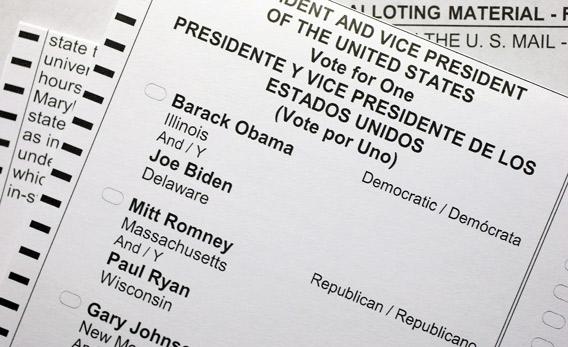Early voters have noticed that, on most state ballots, Gov. Romney appears as “Mitt Romney,” even though Willard is his legal first name. One Explainer reader wants to know how much control candidates have over their ballot listings. Could Romney appear as “Job Creator” Romney, or President Obama as Barack “Hope” Obama?
No. When it comes to the presidential election, voters are technically voting for a political party’s slate of electors, not the candidates themselves, so states allow the parties broad discretion in how names appear. Middle names and nicknames are acceptable, and Mitt Romney isn’t the only candidate who has tweaked his legal name. On the current Vermont ballot, the presidential candidate from the Justice Party appears as “Ross ‘Rocky’ C. Anderson.” There are limitations, however. Through statute, regulation, or precedent, most states bar candidates for any office from using their names to sloganeer on the ballot. Virginia, for example, prohibited Gail Parker from appearing as “Gail ‘For Rail’ Parker.” (Massachusetts and a few other states avoid this problem altogether by listing only the last names of presidential candidates.) States usually have stricter rules for down-ballot candidates, requiring some form of the legal first, middle, and last name. Most states allow nicknames to appear in quotation marks, but there is a limit on the total number of characters.
Some states allow independent candidates to make a political point in the space allocated for party name. Vermonters have the option to send Laurel LaFramboise of the VoteKISS party or Cris Ericson of the United States Marijuana Party to the U.S. Senate this year. (Ericson is also running for governor this year, and won 0.75 percent of the vote in 2010.) There are limitations here as well, though. In 2010, independent Milwaukee Assembly candidate Ieshuh Griffin asked for the phrase “NOT the whiteman’s bitch” to appear below her name on the ballot. The Wisconsin Government Accountability Board rejected the request.
Got a question about today’s news? Ask the Explainer.
Explainer thanks reader Ben Talsma for asking the question.
